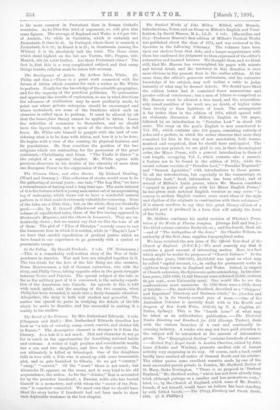The Poetical Works of John Milton. Edited, with Memoir, Introductions,
Notes, and an Essay on Milton's English and Versi- was published about the close of 1874, and was reviewed in the Spectator in the following February. The volumes have been upon our shelves from that date, and a larger acquaintance with them has confirmed the judgment we then expressed of the editor's, exhaustive and learned labours. We thought then, and we think still, that Mr. Masson has overweighted his pages with minute and trivial detail, and the tendency in this direction is even more obvious in the present than in the earlier edition. At the same time, the editor's generous enthusiasm, and his extensive knowledge of his subject, may well incline a critic) to judge leniently of what may be deemed defects. We should have liked the edition better had it contained fewer mannerisms and greater critical conciseness; but a man of letters so competent as Mr. Masson must bo allowed a free hand, and the unquestion- ably sound qualities of his work are, no doubt, of higher value than brevity or than lightness of touch. The arrangement is far better than in the edition of 1874, which opened with an elaborate discussion of Milton's English in 132 pages, followed by an introduction to "Paradise Lost" in about 120 more. The essay on the poet's English is now transferred to- Vol. III., which contains also 472 pages, consisting entirely of notes and a preface, in which the writer observes that more duty remained for him in the way of new annotation, both herme- neutical and exegetical, than he should have anticipated. The ' poems are now printed, we are glad to see, in their chronological' order, the Minor Poems, with a general introduction to them of vast length, occupying Vol. I., which contains also a memoir, a feature not to be found in the edition of 1874; .whilo the second volume consists of "Paradise Lost," "Paradise'Regained," and " Samson Agonistes," with introductions to those poems..
To all the introductions, but especially to the commentary on " Paradise Lost," fresh information has been added; and of several of Milton's Latin poems, which Mr. Masson considers " coequal in power of genius with his Minor English Poems," he has given such metrical English versions as may serve " to convey to modern English readers more exact ideas of the style and rhythm of the originals in combination with their substance." It is almost needless to say that this great library edition of a splendid poet is produced in a form that will satisfy the lover of fine books.






































 Previous page
Previous page